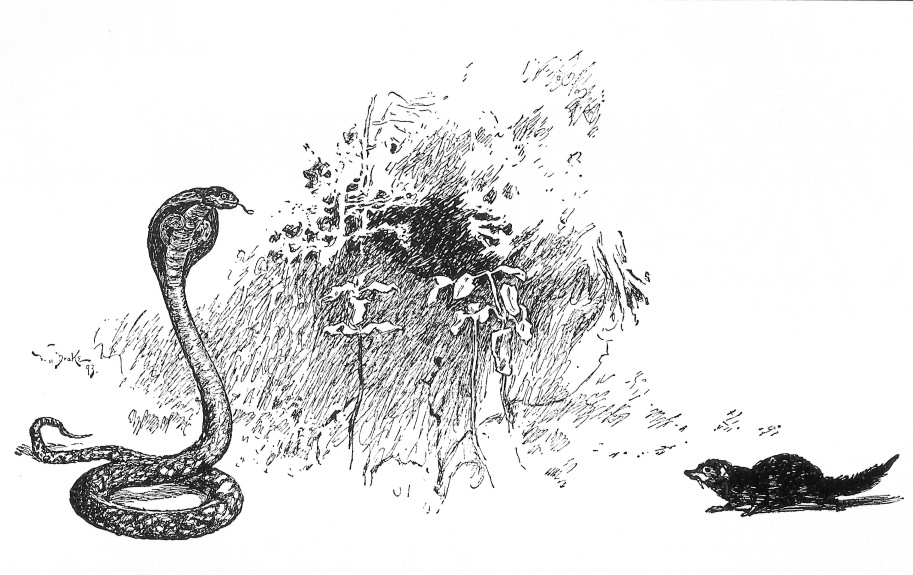कुदृष्टं कुपरिज्ञातं कुश्रुतं कुपरीक्षितम् ।
तन् नरेण न कर्तव्यं नापितेनात्र यत् कृतम् ॥ १ ॥
kudṛṣṭaṃ kuparijñātaṃ kuśrutaṃ kuparīkṣitam |
tan nareṇa na kartavyaṃ nāpitenātra yat kṛtam || 1 ||
One should not get into anything, without thinking of the consequences, without knowing all aspects of it, without proper analysis, and without practically testing it…not like that foolish barber.

There is a city, not so far away from here. It is called PatāliPutra. A rich man named ManiBhadra (the big jewel) lived in PatāliPutra. Though he lived an ideal life, and always played by the rules, a cruel twist of fate made him lose all his wealth. This led him to become sad and depressed.
One night, he sat thinking to himself…”Poverty is such a cruel thing. It is said…
शीलं शौचं क्षान्तिर् दाक्षिण्यं मधुरता कुले जन्म ।
न विराजन्ति हि सर्वे वित्त-विहीनस्य पुसुषस्य ॥ २ ॥
śīlaṃ śaucaṃ kṣāntir dākṣiṇyaṃ madhuratā kule janma |
na virājanti hi sarve vitta-vihīnasya pusuṣasya || 2 ||
Good character, cleanliness, forbearance, politeness, good speech and a good family – all these do not matter if one is poor.
मानो वा दर्पो वा विज्ञानं विभ्रमः सुबुद्धिर् वा ।
सर्वं प्रणश्यति समं वित्त-विहीनो यदा पुरुषः ॥ ३ ॥
māno vā darpo vā vijñānaṃ vibhramaḥ subuddhir vā |
sarvaṃ praṇaśyati samaṃ vitta-vihīno yadā puruṣaḥ || 3 ||
Prestige, pride, talent, charm and intelligence all perish once a man becomes poor.
प्रतिदिवसं याति लयं वसन्त-वाताहतेव शिशिर-श्रीः ।
बुद्धिर् बुद्धिमताम् अपि कुटुम्ब-भर-चिन्तया सततम् ॥ ४ ॥
pratidivasaṃ yāti layaṃ vasanta-vātāhateva śiśira-śrīḥ |
buddhir buddhimatām api kuṭumba-bhara-cintayā satatam || 4 ||
Even the wise lose their ability to think straight when they constantly worry about family, much like the beauty of winter decreases due to the constant winds of spring.
A wise man who is always worrying about how to take care of his family is not able to use his intelligence, which gets wasted in thinking about the daily issues in life.
न विभाव्यन्ते लघवो वित्त-विहीनाः पुरो ऽपि निवसन्तः ।
सततं जात-विनष्टाः पयसाम् इव बुद्बुदाः पयसि ॥ ७ ॥
na vibhāvyante laghavo vitta-vihīnāḥ puro ‘pi nivasantaḥ |
satataṃ jāta-vinaṣṭāḥ payasām iva budbudāḥ payasi || 7 ||
Those who are poor are in such a pitiful state that they are not noticed and are ignored, even if present in front of you, much like the short-lived bubbles in the waters of the ocean.
सुकुलं कुशलं सुजनं विहाय कुल-कुशल-शील-विकलेऽपि ।
आढ्ये कल्प-तराव् इव नित्यं रज्यन्ति जन-निवहाः ॥ ८ ॥
sukulaṃ kuśalaṃ sujanaṃ vihāya kula-kuśala-śīla-vikale’pi |
āḍhye kalpa-tarāv iva nityaṃ rajyanti jana-nivahāḥ || 8 ||
People are always attracted by the rich, even if they are of bad character, have no talent and are from bad families, and people always avoid the poor, even if they are from good families, have good character and are talented.
And thinking this way, ManiBhadra decided to end it once and for all. “I will starve myself to death”, he thought to himself, as he fell asleep.
In the middle of the night, when he was fast asleep, a sanyasi appeared in his dreams and said “My dear ManiBhadra, don’t be depressed. I am PadmaNidhi, and I represent the wealth that you earned in your previous lives. I will come to your house in the morning, in the same form as I am now. You must hit me on the head with a club, and I will instantly turn into gold, and this gold will be inexhaustible. You will never have to worry about money again.”
Thus begins the fifth book of the Panchatantra. अपरीक्षितकारकं – Action without proper thought and analysis. This book is also short (like the fourth book), and has mostly human characters. It also has some of the most engaging stories of the Panchatantra. As we reach the last book of this epic, I feel like I should slow down – because I don’t want this series to end. It’s been over 5 months (I stopped counting actually) when I wrote the first blogpost on it, and I know I have less than a month to go. It will be tough for me, but I also hope that I will be able to do justice to the next topic that I take up.
Till then, let’s find out what ManiBhadra did, tomorrow!
to be continued…
